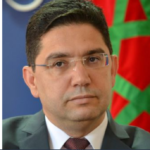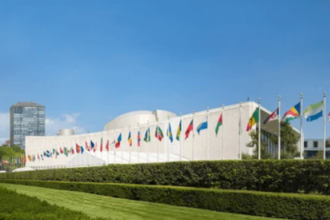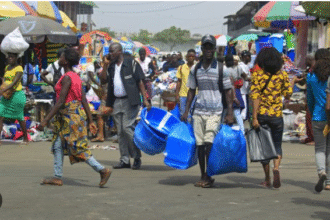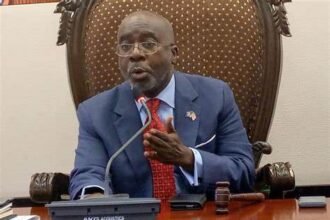Incumbent Liberian President Joseph Nyuma Boakai seems determined to make Liberia a better, self-sufficient, and developed nation with his ARREST Agenda.
In his 29 January 2024 address to the joint chambers of the National Legislature of Liberia, President Boakai unveiled that poverty, drug abuse, corruption, poor infrastructure, and an underperforming economy continue to undermine national development and the livelihood of Liberians.
The Liberian leader said these challenges offer his administration a unique opportunity to set the country on a renewed trajectory.
A cross section of political observers and economic analysts believe two cabinet officials are key to driving and shaping LiberiaŌĆÖs future: The Minister of Agriculture and the Minister of Finance and Economy Planning.
J.┬Ā Alexander Nuetah, PhD is the current minister of agriculture. An experienced Agricultural Economist with more than twenty years of professional experience working with the Ministries of Agriculture, Ministry of Finance, the IMF┬Āand consultancy with various international organization, Nuetah also brings advanced education, credibility, stewardship, and a determination that agriculture must be based on farmers getting the right support and that the resources allocated for agricultural development be used to benefit the country in the truest meaning of the word.

According to credible international donor sources, from 2010 to 2020 and beyond, Liberia received about US$800 million in agricultural funding, including grants and loans from the World Bank. Yet, about 47% of the Liberian population is food insecure. Food insecurity levels had been high across the country and were particularly severe in Liberia’s rural areas, where 51% of the population lives. Agriculture, a key sector in the Liberian economy, is a source of income for over 70% of the population.

The Ministry of Agriculture and its current leadership are focused on reducing waste and ensuring that funds allocated for agriculture be used accordingly to yield the necessary results.
With regular field visits and the launch of the National Agriculture Development Plan (NADP), the sector is proceeding in the right direction. Actual and real smallholder farmers are realizing and making progress, and more Liberians are becoming aware and involved in agricultural activities.
Augustine Kpehe Ngafuan II, a veteran Liberian political economist first became Finance Minister in 2008 and subsequently moved over to the Ministry of Foreign Affairs and lately served as country director of the African Development Bank Group in Uganda.

Most Liberians perceived Ngafuan as an ethical, transparent, and trustworthy official who tends to comply with strict legal and fiscal compliance guidelines.
Both Nuetah and Ngafuan are said to lead by examples and are highly valued in their respective industries where they are seen to comply with these traits.
Why are Nuetah and Ngafuan important to President BoakaiŌĆÖs ARREST Agenda and the prosperity of Liberia?
The World Bank, the African Development Bank Group and other global institutions have, over the years, offered an unsatisfactory perspective of the Liberian economy.
According to the World Bank, ŌĆ£LiberiaŌĆÖs economy expanded by 4.7% in 2023 and is expected to maintain this momentum over the medium term. Growth in 2023 was primarily driven by mining, expansion in gold output, and construction. The services sector grew by 3.7%, driven by the financial and hospitality subsectors, increased trade and transport activities, and improved access to electricity. Output in the agriculture sector grew by a modest 1.4%, reflecting declines in palm oil and rubber production. On the demand side, continued recovery in private consumption, increased public-sector spending, and a surge in gold exports were the main drivers of growth. Growth is expected to remain robust, averaging 5.8% over the medium term supported by renewed interest and investments in mining coupled with continued implementation of critical reforms in key enabling sectors such as energy, transportation, trade, and financial servicesŌĆØ.
The bank further asserts that ŌĆ£The governmentŌĆÖs fiscal deficit reached an unsustainable level in 2023 but is expected to narrow in the medium term. LiberiaŌĆÖs fiscal deficit increased by 1.5% points to 7.1% of GDP in 2023 due to a decline in revenues and grants and increased consumption spending. In the medium term, the fiscal deficit is expected to decrease as the authorities enhance domestic resource mobilization and bolster expenditure controls. Liberia is at moderate risk of external debt distress and high risk of overall debt distress. The countryŌĆÖs debt to GDP ratio stood at 58.8% of GDP in 2023ŌĆØ.
ŌĆ£Headline inflation rose to 10.1% in 2023, up from 7.6% in 2022,primarily driven by food prices, exchange rate depreciation, and monetization of the budgetdeficit.Inflationary pressures have started to ease in 2024 and are expected to remain within single digits in the medium term if the authorities maintain prudent fiscal and monetary policiesŌĆØ, the bank maintains.
The bank states, ŌĆ£LiberiaŌĆÖs savings and investments gap widened during 2023, leading to a current account deficit (CAD) of 26.4% of GDP. Exports increased by 8.2%, slower than the 16.6% growth in 2022, while imports expanded by 27.2% due to higher petroleum products and machinery prices, leading to a higher trade deficit. The CAD was financed by net IMF credit, loans, and drawdowns of gross official reserves. Consequently, gross external reserves fell to US$486 million in 2023 from US$644 million in 2022, covering about two months of imports. The CAD is projected to remain elevated in the medium term, averaging 22% of GDP, due to increased domestic demand and capital imports for vital infrastructure and investmentsŌĆØ.
Both Nuetah and Ngafuan understand the importance of their roles and enjoy the trust and confidence that President Boakai and the Liberian people have in both of them.┬Ā ┬ĀNgafuan plans on increasing government support and contribution to the agricultural sector in next year’s budget.┬Ā With an increased fiscal support, Nuetah, a visionary Liberian agricultural economist, knows what needs to be done by focusing on value addition and prioritizing smallholder farmers and value chain development.
Some recommendations suggest that Minister Nuetah and Minister Ngafuan need to seriously consider and focus on Liberia’s strong participation in the African Continental Free Trade Area (AfCFTA) arrangement and the African Growth and Opportunity Act, or AGOA.
AfCFTA helps to create a single continental market for goods and services in Africa. It further aims to reduce trading problems such as different regulations from one African country to another.
The African Continental Free Trade Area (AfCFTA) is a free trade area encompassing most of Africa. Accordingly, iIt was established in 2018 by the African Continental Free Trade Agreement, which has 43 parties and another 11 signatories, making it the largest free trade area by number of member states, after the World Trade Organization, and the largest in population and geographic size, spanning 1.3 billion people across the world’s second largest continent.
The African Growth and Opportunity Act, or AGOA is a piece of legislation that was approved by the U.S. Congress in May 2000. The stated purpose of this legislation is to assist the economies of sub-Saharan Africa and to improve economic relations between the United States and the region.
Considering all of these intricate factors this is why some pundits and observers of Liberia’s development and progress believe Minister Nuetah and Minister Ngafuan are key in resuscitating the Liberian economy, increasing its path to sustainable development, and enhancing BoakaiŌĆÖs legacy.









